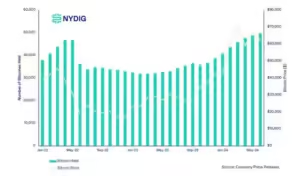Bitcoin ETFs Witness $900M in Net Outflows This Week

QUICK TAKE:
- U.S.-listed spot bitcoin ETFs faced $900 million in outflows this week.
- Thursday marked the fifth consecutive day of net outflows.
- Grayscale’s GBTC and Fidelity’s FBTC led the outflows, while BlackRock’s IBIT recorded net inflows.
Spot bitcoin (BTC) exchange-traded funds (ETFs) listed in the United States experienced a challenging week, marked by consistent net outflows. On Thursday, these ETFs recorded their fifth straight day of net outflows, bringing the week’s total losses to over $900 million. This performance represents the worst series of outflows for these financial products since mid-April.
ETF Outflows Breakdown
Data from SoSoValue revealed that the 11 listed bitcoin ETFs suffered a combined outflow of $140 million on Thursday alone, with trading volumes reaching $1.1 billion. Leading the outflows were Grayscale’s GBTC and Fidelity’s FBTC. GBTC, which has been dealing with outflows since its conversion to an ETF in January, saw $53 million in net outflows. Similarly, Fidelity’s FBTC experienced $51 million in net outflows.
In contrast, BlackRock’s IBIT, which is the largest ETF by assets under management, was the only ETF to record net inflows, albeit modest at $1 million. Other products in the market did not see any significant net inflow or outflow activity during this period.
Historical Context and Market Impact
The recent outflow trend is the most severe since late April when bitcoin ETFs recorded $1.2 billion in total net outflows over a span of trading sessions from April 24 to May 2. Following this period, inflows picked up significantly, with the ETFs adding over $4 billion in the subsequent 19 days of trading. However, this positive momentum was halted, starting from June 10, leading to the current outflow trend.
Factors Contributing to the Outflows
The recent spate of outflows can be attributed to several factors affecting the broader cryptocurrency market and bitcoin specifically. Key among these are:
- Large Holder Sales: There have been significant sales by large bitcoin holders, amounting to $1 billion. Such substantial sell-offs typically exert downward pressure on prices and can trigger further outflows as investors seek to mitigate losses.
- Dollar Strength: The U.S. dollar has shown considerable strength in recent weeks. A stronger dollar often leads investors to move away from riskier assets like cryptocurrencies in favor of more stable investments.
- Robust Technology Index Market: The U.S. technology index has been performing strongly, attracting investment that might otherwise flow into bitcoin ETFs. This shift indicates a preference for equities over digital assets in the current economic climate.
ETF Market Dynamics
Bitcoin ETFs are a relatively new investment vehicle designed to provide investors with exposure to bitcoin without the need to directly purchase and store the digital asset. These funds typically track the price of bitcoin and are traded on traditional stock exchanges, making them accessible to a wider range of investors.
The performance of these ETFs is closely tied to the price movements of bitcoin and the broader sentiment in the cryptocurrency market. Consequently, periods of volatility in bitcoin’s price often lead to significant fluctuations in the net inflows and outflows of these ETFs.
Looking Forward
Despite the recent downturn, the long-term outlook for bitcoin ETFs remains a topic of interest among investors and market analysts. The introduction of these financial products has provided a more regulated and accessible way for individuals and institutions to invest in bitcoin, potentially leading to greater adoption and stability in the market over time.
Furthermore, market participants are closely watching regulatory developments and broader economic trends that could influence the performance of bitcoin and related financial products. As the market matures, the role of ETFs in providing structured exposure to bitcoin is likely to evolve, potentially mitigating some of the volatility seen in recent months.
Conclusion
The recent net outflows from U.S.-listed spot bitcoin ETFs underscore the challenges and volatility inherent in the cryptocurrency market. While Grayscale’s GBTC and Fidelity’s FBTC led the outflows, BlackRock’s IBIT managed to attract net inflows, highlighting a mixed response from investors. As the market continues to navigate economic pressures and regulatory developments, the performance of bitcoin ETFs will remain a crucial barometer of investor sentiment and the overall health of the cryptocurrency market.



